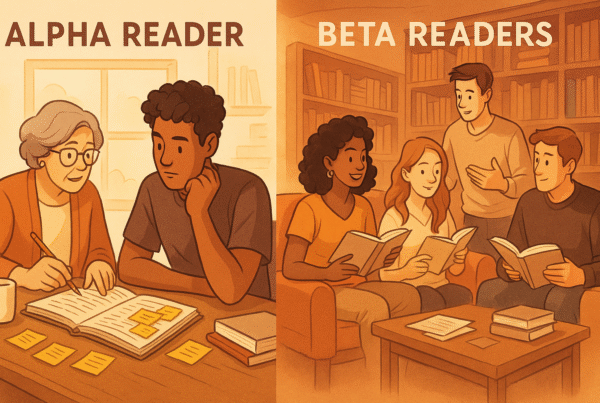Searching for beta readers for hire can save you significant money while still getting valuable manuscript feedback. Beta readers typically charge about one-tenth the cost of professional editors, ranging from as little as $15 to around $450, depending on the service and genre.
While free beta readers are available in communities like the Beta Readers and Critique Partners Facebook Group (with over 24,000 members), professional beta reading services offer more reliable feedback at critical stages of your publishing journey. These readers excel at identifying plot holes, inconsistencies, and unclear passages before their work reaches a broader audience. Importantly, they represent your target readership rather than strictly editorial professionals.
In this article, we’ll compare the seven best platforms where you can find beta readers for hire online. We’ll explore the fees charged by beta readers, what makes a beta reader truly professional, and how to select exemplary service tailored to your specific manuscript needs.
Why choose beta readers for hire instead of using free ones?

Finding reliable readers takes time, and locating quality free beta readers who match your target audience can be a time-consuming process. It can take weeks or even months to assemble enough volunteers in your target market willing to read for free. Meanwhile, vetting and hiring professional readers typically requires days, not months.
1. The value of professional feedback
Professional beta readers bring dedication and reliability that are often hard to find with volunteer readers. When you pay for a service, you’re purchasing peace of mind and feedback.
Beta readers for hire typically offer several distinct advantages:
- Reliability and follow-through: There’s a better chance that beta readers will take your project seriously if you pay them. Since it’s a job, they’ll be more likely to stick to deadlines and answer all your questions.
- Structured, thorough feedback: Most professional beta reading services have received training in giving feedback from professional editors or through their own editorial experience. This training shows in the quality and organization of their comments.
- Objective perspective: Unlike friends and family, who might sugarcoat their opinions, professional beta readers provide honest and unbiased feedback on your work.
- Genre expertise: Many professional beta readers specialize in specific genres, bringing valuable insight into reader expectations within your category.
Additionally, beta readers for hire generally provide more comprehensive assessments. “Both beta readers gave pretty thorough after-reading summaries of their thoughts on the book, including the characters, beginning, middle, and ending.” Services often include chapter-by-chapter feedback, inline comments, and a final report that provides authors with clear, structured insights into what’s working and what’s not.
2. When Free Beta Readers May Not Be Enough
Free beta readers can be helpful, but they often disappear or provide vague feedback. Professional beta readers offer timely, honest critiques with accountability. Discover when investing in feedback is worthwhile and how to strike the ideal balance.
(i) The Risk of Relying on Free Beta Readers
Despite their appeal, free beta readers have significant limitations that can hinder your publishing journey. Volunteer beta readers often disappear without providing feedback, resulting in wasted time and mounting frustration when you rely on their input to improve your manuscript before publication.
- Volunteer beta readers often fail to finish books or provide useful, honest feedback.
- Well-intentioned friends and family seldom offer the objective criticism necessary for manuscript improvement.
- Friends and family may not be the most helpful audience or the desired readers for early drafts of a book.
Personal connections can cloud judgment and lead to overly gentle critiques that don’t identify real issues. Consequently, when deadlines loom or you’re preparing for publication, you need guaranteed feedback.
(ii) Why Professional Beta Readers Are Worth the Investment
With beta readers for hire, you book a professional who is contractually obligated to provide feedback by a specific date. “Because you’re booking a paid service, there’s a higher level of professionalism, so you can expect to receive your feedback on a pre-arranged date rather than waiting for a volunteer reader who might not get around to it.”
Moreover, the enforcement of expectations is made possible through paid services. “When you pay for a beta reading service, the beta reader owes you what you’ve paid for and what both parties have agreed to. If they don’t adhere to the agreement, you should be entitled to a refund”. This accountability isn’t possible with volunteer readers.
(iii) Striking the Balance: When Free Readers Still Work
Nevertheless, beta readers for hire shouldn’t be viewed as mandatory. Suppose you have reliable free readers who understand your genre and provide honest feedback. In that case, you may not need to hire professionals, especially if you’re still in the early stages of the draft.
- For authors, particularly those without extensive writing networks, investing in professional beta readers can be highly beneficial.
- Paying for beta readers is an investment in my future success.
- Beta reader feedback helps catch issues that could lead to negative post-publication reviews.
Would you rather have a reader point out plot holes and typos in a private message or see those criticisms in a public review for all potential readers?
What makes a beta reader ‘professional’?

Professional beta readers differ significantly from casual readers who offer feedback for free. Beyond enjoying books, these individuals bring specialized skills and structured approaches to manuscript evaluation.
1. Experience with published authors
Professional beta readers typically have established track records working with published authors. This experience provides them with insights that casual readers don’t possess. Many professionals have backgrounds in writing or editing themselves, which helps them understand the technical and emotional aspects of receiving feedback on creative work.
What sets professionals apart is their ability to give constructive, respectful, and genuinely helpful feedback. Unlike friends who might hold back criticism, professional beta readers know how to strike a balance between honesty and tact.
Additionally, professional beta readers often participate in:
- Courses or workshops on creative writing and editing to improve their critique skills
- Long-term relationships with authors who trust their judgment
- Beta reading teams for established authors, gaining valuable experience
As one professional beta reader notes, “Finding a good beta reader is often as much about being a good beta reader yourself.” This reciprocal relationship within the literary community enables professional beta readers to refine their skills through practice and collaboration continually.
2. Specialization in specific genres
One hallmark of professional beta readers is their specialization in a particular genre. These readers focus on fantasy, horror, science fiction, or young adult fiction categories. Their familiarity with genre norms allows them to offer feedback grounded in market expectations and reader preferences.
Professional beta readers understand the unique pacing, tropes, and character arcs of each genre. Their targeted insight prevents mismatched critiques and promotes relevant, actionable feedback. With extensive reading backgrounds, they spot narrative gaps that casual readers often miss, making their guidance especially valuable during manuscript development.
3. Clear service offerings and pricing
Professional beta readers offer clear pricing and structured services, unlike casual readers. Rates typically range from $20 to $50 per hour, or approximately $11 per 1,000 words. Longer manuscripts often follow tiered pricing, ensuring transparency and consistency throughout the beta reading process.
Professional beta readers provide clear deliverables, typically including:
- Overall manuscript assessment on a rating scale
- Chapter-by-chapter notes highlighting strengths and weaknesses
- Specific feedback on plot and character development
- Answers to the author’s particular questions about the manuscript
Formal agreements also distinguish professional beta readers. These contracts outline expectations, timeframes, feedback style, and payment terms. This level of professionalism creates accountability that isn’t present with volunteer readers.
Although some writers believe beta reading should always be free, many find that paying for these services yields higher-quality feedback and reliability. One writer observed that paid beta reading leads to “a higher quality of response, better feedback, and if there is something specific I think is wrong, I can direct them to look at it.”
7 Best Platforms to Hire Beta Readers Online
When you hire beta readers, the process doesn’t need to be complicated. These seven platforms offer varying levels of expertise, pricing structures, and specialization to match your manuscript’s specific needs.
1. Upwork: Freelance marketplace with filters
Upwork is a versatile platform for connecting beta readers across experience levels. The site’s filtering system enables you to search by expertise, rating, and price point, making it easier to find readers who are specifically familiar with your genre.
One common observation among authors is that many Upwork listings branded as “beta reading” offer more comprehensive editing or proofreading services. It can be advantageous if you seek feedback beyond typical beta reading.
To optimize your Upwork beta reader search experience, utilize specific filters for your genre and clearly outline your expectations in the job posting. Most beta readers on the platform charge hourly rates, typically ranging from $15 to $ 30 per hour.
Beta Reading on Upwork
| Freelancer & Service | Key Features | Price | Highlights | Profile |
| Roha T: Excellent Beta Reading | Top-rated freelancer offering fast, detailed full manuscript reviews. | $50 | 97% job success; contract and refund protection | View Profile |
| Ian O. / Lara K: In‑depth Beta Reading & Critique | Thorough analysis from the reader + editor perspective; genre feedback | $30 | 4.9–5.0 ratings; structured reader/editor views | View Profile |
| Ilayda Y: Bestseller Blueprint (“detective style”) | Strategic story development, creative feedback, and consultation included | Price varies | 97% job success; consultation + tailored suggestions | View Profile |
| Maryam N: Detailed Critique & Feedback Report | Inline comments, sensitivity reading, diversity insights, deluxe report | $25 | 100% success; “sharp, objective feedback” noted by clients | View Profile |
2. Fiverr: Budget-friendly beta reader gigs
Fiverr hosts thousands of beta readers for hire online with services starting from as low as $5, making it ideal for authors on tight budgets. The platform currently features over 6,400 beta reading services across all genres.
What sets Fiverr apart is its transparent rating system and diverse pricing tiers. Top-rated beta readers on Fiverr typically charge between $25 and $105 per manuscript, with many offering package deals that include both alpha and beta reading services.
Notable Fiverr features include:
- Detailed seller profiles with portfolio samples
- Clear turnaround times (typically 3-15 days)
- Specialized readers for specific genres like romance, fantasy, and YA fiction
First-time authors often appreciate Fiverr’s straightforward gig system, clearly outlining deliverables before purchase.
Genre-Specific Beta Reading on Fiverr
| Category | Price | Service Description | Browse |
| Romance | $25-40 | Romance novel beta reading specialists. Experienced freelancers focusing on tropes, character development, and emotional arcs. | Romance Beta Readers |
| Fantasy & Sci-Fi | $30-50 | Beta readers specialized in fantasy and science fiction genres. Expertise in world-building, magic systems, and speculative elements. | Fantasy/Sci-Fi Beta Readers |
| Young Adult | $25-45 | Beta readers who understand YA voice, pacing, and themes. Experienced with teen protagonists and coming-of-age stories. | Young Adult Beta Readers |
| General Fiction | $20-35 | Various freelancers offer beta reading services across different genres with competitive pricing and comprehensive feedback. | All Beta Readers |
3. Freelancer.com: Competitive bidding system
Freelancer.com utilizes a unique bidding system where beta readers compete for your project online, often resulting in competitive pricing. According to platform statistics, their beta reading professionals maintain an impressive 4.8 out of 5 stars, based on nearly 8,800 reviews.
The platform defines beta reading as a comprehensive process that evaluates grammar and spelling, sentence structure, emotional connections, and narrative flow. This broader approach provides multidimensional feedback on your manuscript.
Freelancer.com’s beta readers typically charge between $15 and $100 per hour, depending on their experience level. For complete manuscripts, you can hire professionals on fixed-price arrangements.
Freelancer Writing and Beta Reading Services
| Category | Price | Service Description | Browse |
| Science Fiction | $15-25/hour | Experienced beta readers for sci-fi manuscripts. Focus on plot coherence, world-building, and scientific accuracy in speculative fiction. | Sci-Fi Beta Reading |
| Erotic/Adult Fiction | $10-30/project | Beta readers specializing in adult and erotic fiction, including novellas and series. Comfortable with mature content and genre conventions. | Adult Fiction Beta Reading |
| Mystery & Thriller | $20-40/project | Beta readers are experienced in crime, mystery, and thriller genres. Focus on pacing, plot twists, and suspense-building techniques. | Mystery/Thriller Beta Reading |
| General Fiction | $10-30/project | Comprehensive beta reading services for all fiction genres. Covers plot, character development, pacing, and overall manuscript feedback. | All Beta Reading |
4. Guru.com: Niche professionals for hire
Guru.com offers a more curated selection of beta readers for hire online, many of whom have specialized backgrounds in particular genres or writing styles. The platform’s WorkRooms feature facilitates seamless collaboration between authors and beta readers.
Once you hire beta readers through your project posting, you’ll receive quotes from qualified freelancers within hours. Guru’s SafePay system adds an extra layer of security; you only release payment after reviewing and approving the completed work.
Many Guru beta readers provide comprehensive services beyond basic feedback, including developmental suggestions and emotional impact assessments. It makes the platform particularly valuable for authors seeking more profound insights.
Guru Professional Beta Reading Services
| Category | Price | Service Description | Browse |
| Beta Readers | $15-40/project | Professional beta reading services with comprehensive feedback on plot, character development, pacing, and overall readability from 350+ freelancers. | Beta Readers |
| Manuscript Critique Services | $20-60/project | Detailed manuscript critiques and developmental editing from experienced professionals across multiple genres, including fantasy, romance, and thriller. | Developmental Editors |
| Book Editing Services | $25-75/project | Comprehensive book editing services from 6,701+ freelancers offering manuscript review, structural editing, and publication preparation. | Book Editors |
| Reading Specialists | $10-35/project | Specialized reading services, including beta reading, manuscript evaluation, and reader feedback from professional reading specialists. | Reading Specialists |
5. Truelancer.com: Global freelance talent
Truelancer connects authors with beta readers for hire online from diverse cultural backgrounds, offering fresh perspectives that readers might miss from a single cultural context. The platform emphasizes secure payment protection through its escrow system.
Beyond standard beta reading, many Truelancer professionals offer specialized testing services for elements like dialog authenticity or character relatability. The platform’s international talent pool can be especially valuable when targeting global markets with your writing.
Beta Reading Options on Truelancer
| Category | Price | Service Description | Browse |
| Proofreading & Editing | $5-30/project | Professional proofreading and editing services for manuscripts, including beta reading feedback and comprehensive manuscript review. | Proofreading Jobs |
| Writing Services | $10-50/project | Professional writing services encompass manuscript development, creative writing assistance, and beta reading for a range of genres. | Writing Services |
| Content Writing | $8-40/project | Content writing services that include manuscript critique, beta reading, and developmental feedback for fiction and non-fiction works. | Content Writing |
| General Services | $5-25/project | Browse all freelance services where you can find beta readers, manuscript reviewers, and editing professionals across different specializations. | All Services |
6. PeoplePerHour: Hourly or project-based hiring
PeoplePerHour offers flexibility in engaging beta readers with hourly and project-based options. Entry-level services start around $10 for 2,000 words, making it accessible for testing chapters before committing to full manuscript reviews.
The platform stands out for its detailed job posting system, which allows you to specify precisely what type of feedback you seek. Many beta readers on PeoplePerHour offer specialized packages that focus on elements such as character development or plot consistency.
One UK-based job posting specifically sought beta readers for Kindle ebooks. The posting emphasized that candidates must have an active Amazon account with a minimum of $50 in purchases made during the previous year. It also highlighted how some authors use the platform to find beta readers familiar with specific publishing formats.
Beta Reading Categories on PeoplePerHour
| Category | Price | Service Description | Browse |
| Beta Reading Services | £15-50/project | Professional beta reading with holistic feedback on plot, character, setting, tone, pacing, style, and grammar. Includes detailed reports covering story evaluation. | Beta Reading Services |
| Proofreading Services | £10-40/project | Professional proofreading services for manuscripts, documents, and creative writing from experienced freelancers worldwide. | Proofreading Services |
| Content Writing Services | £8-35/project | Content writing and manuscript development services, including creative writing assistance and story development support. | Content Writing |
| Writing & Translation Category | £12-45/project | Complete writing and translation services including manuscript editing, beta reading, and comprehensive writing support across all genres. | Writing & Translation |
7. Reedsy: Curated professionals for authors
Reedsy differs from other platforms by focusing exclusively on publishing professionals. Their curated marketplace connects authors with beta readers who often have experience working with published authors.
According to platform experts, Reedsy is ideally suited for authors with “a solid draft ready to be edited by professionals.” Many professional beta reading services on Reedsy recommend having your manuscript reviewed by beta readers before seeking more expensive developmental editing services.
One author highlighted that Reedsy professionals have “edited several bestsellers in their portfolio.” This caliber of experience comes at a premium price. Still, many authors find the investment worthwhile for the quality of feedback received.
Interestingly, Reedsy also offers a free book-writing app with sharing capabilities. It allows you to create a unique URL to share with beta readers. The primary limitation is that readers cannot make direct suggestions or notes within the shared document.
How to choose the right platform for your needs

Selecting the ideal platform for hiring beta readers requires balancing several factors beyond just cost. Your manuscript deserves feedback from the right readers through a system that meets your needs.
1. Comparing pricing and service quality
Pricing structures vary dramatically across platforms, making direct comparisons essential. Most freelance sites offer three standard payment models:
- Per-word pricing: Typically ranges from $0.0010 to $0.0011 per word (approximately $10-11 per 1,000 words)
- Hourly rates: Generally between $15 and $ 50 per hour, depending on experience
- Fixed-price packages: For complete manuscripts, often starting around $30 for 5,000 words
Surprisingly, higher prices don’t always guarantee better quality. Instead, look for clearly defined deliverables. Professional services typically provide structured feedback, including chapter-by-chapter notes, overall manuscript assessments, and specific responses to your questions.
Expect tiered pricing for longer manuscripts. One service charges $397 for books under 120,000 words and $467 for books between 120,000 and 180,000 words. Subsequently, custom quotes are offered for manuscripts exceeding these lengths.
When evaluating service quality, examine sample reports if available. Comprehensive beta reading should include inline comments and broader narrative assessments, rather than simply providing proofreading corrections.
2. Ease of communication and project management
The feedback collection process varies significantly across platforms, impacting your experience and the quality of insights you receive.
Upwork and Freelancer.com primarily rely on their built-in messaging systems, whereas specialized beta reading platforms offer more tailored solutions. Beta Books, for instance, allows writers to track reader progress in real-time, seeing exactly how far each reader has advanced through their manuscript.
Document-sharing capabilities represent another crucial consideration. Some options include:
- Google Docs/Microsoft Word: Allows inline comments but requires creating accounts for some users
- Beta Books: Purpose-built for beta reading with reader tracking and comment organization by chapter
- Dedicated platforms: Services like betareader.io offer secure document sharing with embedded surveys between chapters
The ability to organize feedback effectively should not be underestimated. Platforms enable you to review comments from specific beta readers or individual chapters, allowing you to revise your planning more efficiently.
3. Review systems and trust factors.
Before you hire beta readers, evaluate the platform’s document security, vetting process, and client feedback. Trusted services use watermarking, secure servers, and rating systems like Upwork and Freelancer.com, where high-rated readers demonstrate reliability and professionalism backed by verified reviews.
Platforms like Guru.com offer payment protection through escrow systems, ensuring authors only release funds once their work meets expectations. Before selecting a platform, carefully consider genre fit, pricing models, and reader accountability. Balancing security, quality, and budget ensures a positive beta reading experience tailored to your manuscript’s needs.
How to post a beta reader job effectively
Creating an effective job posting remains crucial when you hire beta readers online. A well-crafted listing attracts qualified professionals and sets the stage for productive feedback that improves your manuscript.
1. Writing a clear job description
The success of your beta reading experience begins with a comprehensive job description. Initially, include a brief yet engaging synopsis of your book to give potential readers context. Your description should specify your target audience, such as “young adults who love space operas” or “women who adore military dramas.”
Be forthcoming about potentially sensitive content. If your manuscript contains suicide, rape, explicit sex scenes, profanity, or gore, mention this upfront. Transparency about sensitive topics prevents negative feedback based on content surprises. It reduces the likelihood of readers abandoning your project midway.
For maximum effectiveness, your job description should include:
- Genre and subgenre specifics
- Word count and manuscript completion status
- Target readership demographics
- Timeline expectations
- Specific feedback areas you’re concerned about
Mentioning if you’ve already completed multiple drafts signals to professionals that your manuscript has undergone preliminary refinement. This information helps beta readers understand your manuscript’s development stage and adjust their feedback accordingly.
2. Setting expectations and deliverables
Clear communication is essential for successful beta reading partnerships. Set firm deadlines around four weeks and clarify feedback formats, such as chapter notes, in-text comments, or structured questionnaires. Define whether you want big-picture analysis or detailed line editing.
Standardize manuscript formatting by using double spacing, page numbers, and chapter labels. Also, agree on preferred communication methods, such as email, messaging, or collaborative tools, to avoid confusion. Providing these details upfront helps beta readers deliver the type of feedback that truly benefits your manuscript.
3. Choosing between hourly and fixed-price models
When posting beta reader jobs, you’ll typically choose between hourly and fixed-price payment structures. On Upwork, hourly contracts start at a minimum of $3.00 per hour, whereas fixed-price agreements begin at $5.00 per project.
Hourly models work best when:
- Your manuscript length is uncertain
- You want ongoing communication throughout the reading process
- You need flexibility for additional questions
Fixed-price arrangements, primarily utilizing milestone systems, offer more precise budget control. With platforms like Guru.com, you deposit funds, which are released only after you review and approve the completed work. This creates security for both parties while maintaining accountability.
Consider hourly arrangements allowing beta readers to track time for shorter works or chapter samples through platform tools. Yet, fixed-price models with clearly defined deliverables typically offer better value and predictability for complete manuscripts.
What to ask before hiring a beta reader

Once you’ve identified potential beta readers for hire, the next critical step is the interview process. Before committing your manuscript to someone’s care, asking targeted questions helps ensure you’ll receive valuable feedback that improves your work.
1. Have you worked in this genre before?
Genre expertise is the most crucial qualification for professional beta readers. First and foremost, beta readers should be well-read in your specific genre and have extensive experience with similar books. As one expert notes, “There’s not much point giving your YA LGBTQ steampunk mermaid romance to your rather dusty and conventional classics professor and asking her opinion.”
When evaluating a beta reader or candidates on platforms like Upwork or Fiverr, verify that they regularly read books similar to yours. One writer shares, “I looked for freelancers who were avid readers of my genre. Before I hired them, I asked them what their favorite YA and Sci-Fi books are and what the most recent YA book they read is, and then chose readers who like books I also enjoy.”
Genre specialists understand reader expectations, tropes, and conventions that generalists might miss. Indeed, professionals with genre expertise provide more targeted feedback about market fit and audience reception.
2. What kind of feedback do you provide?
Professional beta readers offer a range of feedback styles and delivery methods. Understanding precisely what you’ll receive helps set proper expectations. Ask specifically about:
- Delivery format (chapter-by-chapter notes, inline comments, separate document)
- Feedback focus (character development, plot holes, pacing issues)
- Level of detail (general impressions vs. specific examples)
One beta reader explains the difference: “Beta Reading focuses on high-level comments on plot, characters, and events rather than grammar and spelling corrections.” Professional services typically provide more structured feedback than volunteer readers.
Some professionals offer comprehensive feedback resembling developmental editing: “Based on the first few paragraphs, your main character feels disproportionately hostile to his wife, given she seems to want to visit her sick father.” This level of analysis proves much more valuable than simple proofreading.
3. Can you share samples or references?
Requesting anonymized feedback samples helps evaluate the quality of a beta reader. Platform professionals, such as Guru.com or Truelancer, often showcase client-approved examples that highlight their feedback style, analysis depth, and attention to detail —key traits when assessing manuscript compatibility.
Ask about experience with published authors, availability, and reading speed; most suggest a 2–4 week window for optimal feedback. An effective interview process with targeted questions on genre expertise and previous work ensures you select a beta reader suited to your manuscript’s goals and expectations.
Managing feedback and revisions

After receiving feedback from beta readers, the real work begins. Navigating through comments and deciding what changes to make can be overwhelming and enlightening.
1. How to interpret conflicting feedback
Beta reading feedback isn’t always unanimous. Oftentimes, readers will disagree on characters, plot points, or pacing. The secret lies in looking for patterns. If multiple beta readers flag the same issue, it deserves immediate attention. Consider separating feedback into two categories:
- Objective feedback: verifiable issues like grammar errors or plot inconsistencies
- Subjective feedback: personal opinions that reflect individual taste
Professional beta reader services typically recommend following the majority rule: if most readers (three out of five or more) express concern about something, seriously consider revisions. Conversely, if only a minority mentions an issue, you have more freedom to decide.
2. When to revise and when to trust your gut
Even renowned authors don’t incorporate every piece of feedback they receive. One professional notes that approximately 95% of feedback warrants immediate agreement, and 4% deserves consideration after initial resistance. Yet, that final 1% might not align with your vision.
Remember that, ultimately, it’s your manuscript. Make decisions based on what genuinely improves the book, not because you’re exhausted from revisions. If your intuition strongly suggests a change will strengthen your work, pursue it regardless of the additional effort required.
3. Keeping your voice while improving the draft
Preserving your unique authorial voice remains paramount throughout revisions based on beta reader feedback. Your voice encompasses everything from word choice and sentence length to overall tone, which makes your writing distinctively yours.
Professional beta readers should help refine your manuscript without bulldozing your style. Good feedback focuses on clarity and effectiveness without imposing the reader’s preferences. As one editor notes, “If the only reason I can muster for revising text is ‘I would never write it like that,’ I leave the sentence alone.”
The revision process works best when viewed as a dialogue rather than a directive. Quality beta reader platforms, such as Upwork and Fiverr, connect you with professionals who understand this delicate balance.
Finding the Right Beta Readers: A Worthwhile Investment
Finding quality beta readers for hire is essential in your publishing process. Professional beta readers offer structured, reliable feedback that free options often lack. Platforms like Fiverr, Upwork, and Reedsy provide budget-friendly and premium choices. Depending on the manuscript length and the depth of feedback, services typically cost $15–$450, offering value before complete editing.
Your platform choice depends on your needs. Fiverr offers simplicity and upfront pricing. Guru and Reedsy cater to niche authors who need genre-specific insights. Freelancer.com enables budget bidding. Always create detailed job posts that specify genre, audience, and expectations. Asking about the experience and feedback style ensures you receive helpful, rather than superficial, commentary.
Beta readers improve your manuscript without changing your voice. Look for repeated feedback patterns instead of reacting to every opinion. Use your instincts to choose what fits your story. Beta reading bridges the gap between drafting and editing, making it a valuable, affordable investment in your book’s development and success.


